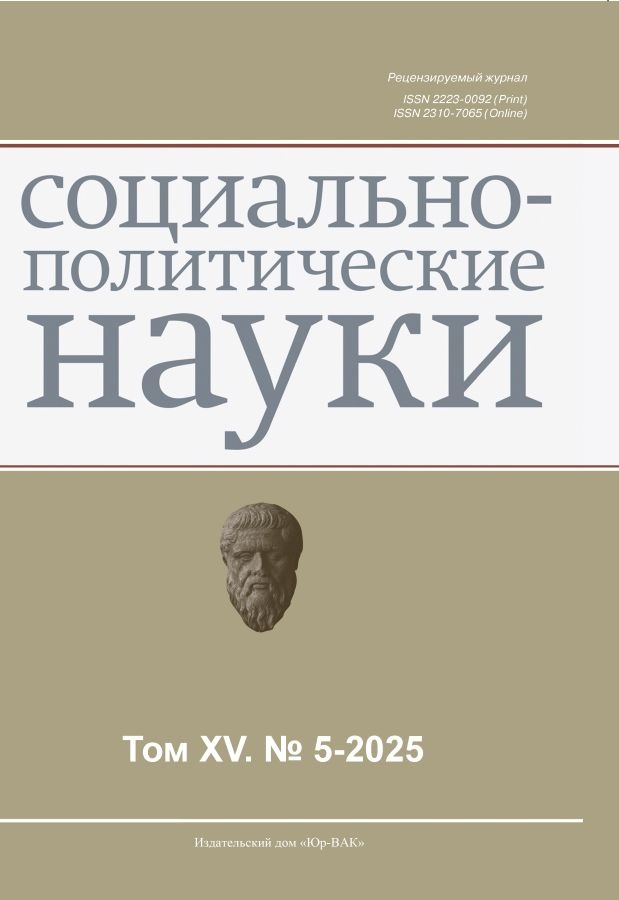Military-space Cooperation of the BRICS Countries and the Militarization of Outer Space
- Authors: Shangaraev R.N.1, Mirovaia S.S.1
-
Affiliations:
- Diplomatic Academy of the Ministry of Foreign Affairs of the Russian Federation
- Issue: Vol 15, No 5 (2025)
- Pages: 120-129
- Section: International Relations, Global and Regional Studies
- URL: https://journals.eco-vector.com/2223-0092/article/view/696800
- DOI: https://doi.org/10.33693/2223-0092-2025-15-5-120-129
- EDN: https://elibrary.ru/CRMJEV
- ID: 696800
Cite item
Abstract
The purpose of the study. The article presents a comprehensive analysis of the military and political aspects of space cooperation between the BRICS countries in the context of the increasing militarization of near-Earth space and the crisis of universal international legal regimes. The study aims to identify the specifics and dynamics of interaction between key emerging and traditional space powers within the framework of the association, as well as to assess their combined potential in contrast to the dominance of traditional space superpowers. Within the framework of this goal, tasks are being solved to study the evolution of the legal regime of outer space, to compare the military space potentials of the participating countries, to assess the effectiveness of existing coordination mechanisms (such as a Working Group and a Consortium of Space Agencies) and to formulate specific promising areas for strengthening strategic partnership in the field of security. Results. As a result of the conducted research, the author concluded that cooperation within the framework of BRICS has a unique and significant potential for the formation of a balanced, stable and multipolar space security architecture, an alternative to models dominated by one superpower. Despite the continuing organizational, legal and financial challenges associated with the harmonization of legislation, cost allocation and the creation of uniform standards, the association demonstrates a steady positive trend – the evolution from disparate initiatives and virtual structures to a full-fledged strategic partnership and institutionalization, for example, the creation of a Space Agency Forum. The key advantage is the integration of the competencies of the participants: the technological power of Russia and China, the growing opportunities of India, the niche potential of Brazil, South Africa and the new members of the association. This complementarity, supported by pragmatic civilian projects (the joint remote sensing grouping), creates the necessary foundation of trust for the transition to more complex forms of interaction in the military-political sphere, such as coordination in the field of space control, the development of confidence-building measures and joint standards of responsible behavior. Thus, BRICS represents an emerging competitive center of power capable of ensuring the technological sovereignty of its members, strengthening their negotiating positions on the global stage and becoming a real stabilizing factor making a practical contribution to preventing an arms race and ensuring the long-term sustainability of space activities. Further consolidation of efforts in this direction seems not only promising, but also necessary to maintain strategic parity in the new geopolitical space.
Full Text
About the authors
Ruslan N. Shangaraev
Diplomatic Academy of the Ministry of Foreign Affairs of the Russian Federation
Author for correspondence.
Email: r.shangaraev@dipacademy.ru
ORCID iD: 0000-0001-6557-4388
SPIN-code: 2180-0229
Dr. Sci. (Polit.), Cand. Sci. (Econ.), Associate Professor; Professor, Department of Strategic Communications and Public Administration
Russian Federation, MoscowSofia S. Mirovaia
Diplomatic Academy of the Ministry of Foreign Affairs of the Russian Federation
Email: mirovaia-s@mail.ru
ORCID iD: 0009-0008-2078-4523
SPIN-code: 8937-0130
applicant
Russian Federation, MoscowReferences
- Volkov A.P., Shangaraev R.N. BRICS, SCO and EAEU integration in context of formation of multipolar world. Sociopolitical Sciences. 2025. Vol. 15. No. 2. Pp. 153–163. (In Rus.). doi: 10.33693/2223-0092-2025-15-2-153-163. EDN: NVKPMF.
- Goncharov S.V., Margiya S.R. The SCO as the engine of a new multipolar world. In: Current issues in international relations and the global economy: Proceedings of the 1st Scientific Conference of the Student Scientific Association of the Diplomatic Academy of the Ministry of Foreign Affairs of Russia. Moscow: Diplomatic Academy of the Russian Ministry of Foreign Affairs, 2024. Pp. 523–530.
- Zernov V.A., Karpovich O.G., Grishankov D.E. Prospects for the development of cooperation in technical and vocational education within the framework of BRICS. Legal Education and Science. 2025. No. 4. Pp. 30–35. (In Rus.)
- Kapustin A.Ya. Formation of a modern international legal concept of space exploration and use. Monograph. Moscow: INFRA-M, 2021. 264 p.
- Karpovich O.G., Nogmova A.Sh., Pashentsev E.N., Yakhmenev P.A. BRICS: education, science, personnel training. Monograph. O.G. Karpovich (ed.). Moscow: Diplomatic Academy of the Ministry of Foreign Affairs of Russia, 2025. 222 p.
- Karpovich O.G. Theory and methodology of personnel training for the higher education system of the BRICS countries. Legal Education and Science. 2025. No. 8. Pp. 9–14. (In Rus.)
- Karpovich O.G. Promising areas for the export of Russian education within the framework of BRICS. International Affairs. 2025. No. 7. Pp. 82–89.
- Karpovich O.G., Volkov A.P. Russia’s national interests in BRICS: institutional and geopolitical aspects. Bulletin of the Diplomatic Academy of the Ministry of Foreign Affairs of Russia. Russia and the World. 2025. No. 1 (43). Pp. 6–22.
- Mustafin T.A. Artificial intelligence as a driver in the BRICS countries. Economics and Entrepreneurship. 2024. No. 11 (172). Pp. 241–245. (In Rus.)
- Strigunova N.N., Karpovich O.G. BRICS scientific diplomacy in the context of the results of the Russian presidency in 2024 and the expansion of the association. Legal Education and Science. 2025. No. 6. Pp. 88–95.
Supplementary files









